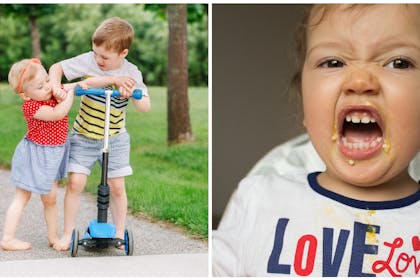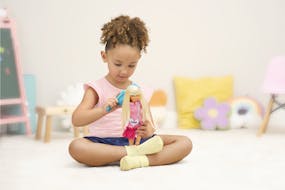Ever wonder about "second child personality"? Do you feel like your first-born is more well-behaved than your second child? According to scientists, you could be right.
This page contains affiliate links, which means we may earn a small amount of money if a reader clicks through and makes a purchase. All our articles and reviews are written independently by the Netmums editorial team.
What’s your second child doing right now? Playing happily with his sibling … or getting up to mischief? If it's the latter, you’re not alone.
Recent research looked at thousands of families in Denmark and America, and found that the child born second in the family is likely to be more challenging.
And even more so if he’s a boy, according to the study.
Researcher Joseph Doyle, who led the study, also found the second child is likely to have more behavioural issues than a first-born.
Not only that, the study found ‘second-born boys are … 20% to 40% more likely to be disciplined in school and enter the criminal justice system compared to first-born boys, even when we compare [them with] siblings.’
And this is apparently down to the level of attention parents give to the second-born child. (Here we go, more parental guilt. Ugh.)
The researchers said, ‘We consider differences in parental attention as a potential contributing factor to the gaps in delinquency across the birth order.’
How does birth order affect a child’s behaviour?
It’s not the first research to look at how birth order can affect your children, with another study finding it can even affect your child’s career choice.
Yet before you panic that your second child will always be harder to handle, there is some good news.
Parenting expert Claire Halsey told Netmums, ‘No matter whether your child is born first, middle, or last, there are plenty of straightforward ways to get the behaviour you want from them.’
3 ways to improve your child's behaviour
Claire suggests three simple methods:
1
Notice the good behaviour
‘Children really do want to please so make a conscious effort to notice, pay attention and praise them when they're doing something positive, such as sharing, helping others, using kind hands or a quiet voice.’
2
Set a good example yourself
‘You are the most important role model and they are watching what you do and copying it all the time.’
3
Be clear about what you want
‘A few very simple rules go down well, such as we eat our dinner at the table, use polite words and take turns.’
How To Talk So Little Kids Will Listen: A Survival Guide to Life with Children Ages 2-7 by Joanna Faber is must-read. See more details here at Amazon.
How to deal with bad behaviour in your child
'Try to prevent bad behaviour as much as possible by keeping children busy and engaged, giving them your full attention and being clear how much you like their positive behaviour,' says Claire.
'If there is misbehaviour, give your child a chance to stop what he is doing and behave well.
‘If he can't then using consequences that are brief – such as taking a toy away for a minute or two if he isn't sharing – may be enough.
‘Of course, if he's hurting someone else then separating him from the situation for a while is important.’
Read more about the second child
- 13 differences between parenting your first and second child
- Age gaps -- is there a perfect amount of time between babies?
- 'I feel differently toward my second child -- help!'
- The 8 gifts mums really want after having a second baby










